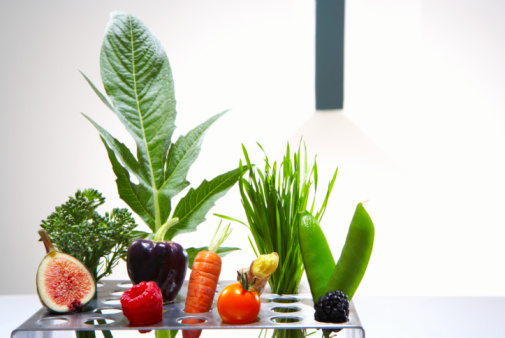Antioxidants, Skin Superheroes from the Inside out
RENÉE LOUX
Women’s Health GLOW
Free radicals… You don’t like them, but do you know why?
Well, here’s the Reader’s Digest version: Free radicals are rogue molecules that have at least one unpaired electron, making them unstable and highly reactive. They’re present in pollution, smoke and are caused by radiation and UV rays. But even if you live off of your air purifier and slather yourself in broad-spectrum sunblock, you can’t quite escape free radicals. You see, they are also byproducts of the natural functions of the body.
Free radicals riot around trying to co-opt their missing electrons and gain stability, wreaking havoc by robbing natural proteins in skin and bullying healthy cells for their electrons. This kind of thievery and pillaging causes a chain reaction, breaking and damaging healthy molecules and cells, damaging tissue and skin, and ultimately weakening the cellular structure and altering the skin’s DNA.
Antioxidants to the rescue! These superheroes for our skin combat and protect against free radicals by binding to them, rendering them inactive, and sweeping them out of the body. Pretty cool, huh?
Here, some of the most active and effective antioxidants for perfect skin. Plus, the superfoods that pack the biggest punch:
CLICK HERE FOR THE FULL ARTICLE
VITAMIN C
Vitamin C is a preventative and reparative antioxidant. Mighty C guards against oxidative damage and actively stimulates collagen production to the max. Because vitamin C is water-soluble and our body is unable to stash troves of it, it’s essential to continuously restock our treasury of this skin-aid nutrient. Eating ample amounts of food loaded with vitamin C is key. An article published by the Journal of Cosmetic Dermatology shows that this mighty vitamin deactivates UV-induced free radicals and can reverse UV damage to DNA.
Get your daily dose of vitamin C through spicy, green and sweet-tart foods such as chili peppers, parsley, broccoli, and leafy greens, citrus, bell peppers, and strawberries.
VITAMIN E
Vitamin E is an interceptive and stabilizing antioxidant. It supports skin’s natural defense systems and neutralizes rogue free radicals caused by the sun’s rays. As a fat-soluble vitamin, E protects and fortifies cell membranes and skin, which are high in fatty lipids and unsaturated fatty acids.
Vitamin E is a communally oriented nutrient. It intercepts unstable free radicals by giving up one of its own electrons to stabilize the cause. Plus, studies show that vitamin E & C are more effective in combination together than solo to inhibit damage from free radical rebels, boost skin metabolism, and protect DNA.
When it comes to foods rich in antioxidant vitamin E, think luscious oils and healthy fats: olives and olive oil, flax seeds and oil, pumpkin seeds and oil, sunflower seeds and oil, as well as almonds, hazelnuts, avocados, and sweet potatoes. Vitamin E is heat-sensitive and cooking at high temperatures will destroy this precious cargo. To benefit from optimum levels, opt for raw seeds and nuts and try adding oils after cooking.
SELENIUM
Selenium is a trace mineral that is essential to good health. And a little bit goes a long way to protect and repair skin all the way down to its DNA.
It's a chief constituent to preserve skin elasticity and ably recruits our skin’s own natural antioxidant enzymes to protect and serve. Selenium guards and repairs DNA in part by reducing DNA-binding proteins from mucking up the works. For added protection from UV-induced inflammation and to prevent and reverse sun-damage and photo-aging, selenium and vitamin E together are more effective than each on its own.
Up your intake of selenium with Brazil nuts – just one Brazil nut a day ensures adequate daily provision. Or try adding a few drops of Brazil nut oil to your favorite moisturizing lotion or cream.
ALPHA-LIPOIC ACID
Alpha-Lipoic Acid (ALA) is considered a “universal antioxidant” because it’s both fat-soluble and water-soluble, meaning it can come aid all kinds of tissues to foster strong, flexible, resilient cells. Loaded with potent anti-inflammatory agents, ALA mitigates pro-inflammatory compounds that trigger oxidative stress and accelerate aging.
This dynamic antioxidant activates and regulates collagen in skin, including digesting damaged collagen that leads to stiffness and wrinkles for a smooth, juicy complexion.
To stock your Alpha-Lipoic Acid reserves through food, eat dark leafy greens: collards, kale, and spinach are loaded with this skin-boosting antioxidant.
COENZYME Q10
Coenzyme Q10 is an essential antioxidant found in nearly every living cell of our bodies. Without it, our cells can’t function properly. It energizes a cell by boosting the production of the energy components, aiding renewal and repair of skin.
Increase your age-defying CoQ10 reserves with ample servings of whole grains and fish or try taking it as a supplement in capsules or gel caps.
VITAMIN P - PROANTHOCYANIDINS
Proanthocyanidins are some of the most powerful topical and internal antioxidants. Known to protect collagen, the foundation of blood vessels, skin, and structural tissue, this active compound works double-time to boost the effects of vitamins C & E. Plus, scientific studies have shown that the antioxidant power of proanthocyanidins is 20 times greater than vitamin E and 50 times greater than vitamin C. Yowza! Both topically and internally, proanthocsyanidins are anti-inflammatory champs and up the ante on skin hydration.
Cocoa (yes, chocolate!) has one of the highest concentrations of proanthocyanidins. Other abundant sources include the skin and seeds of grapes, apples, certain berries such as açai, black currants, cranberries, and wild blueberries. And start sipping—green and black tea are also great sources of this antioxidant.



